Veranstaltungsarchiv Thomas Mann House
November 2024
"Citizenship As Political Membership: A Fundamental Strand of 20th and 21st Century European History"
UCLA Department of Sociology (264 Haines Hall 375 Portola Plaza Los Angeles, CA 90095-1551)
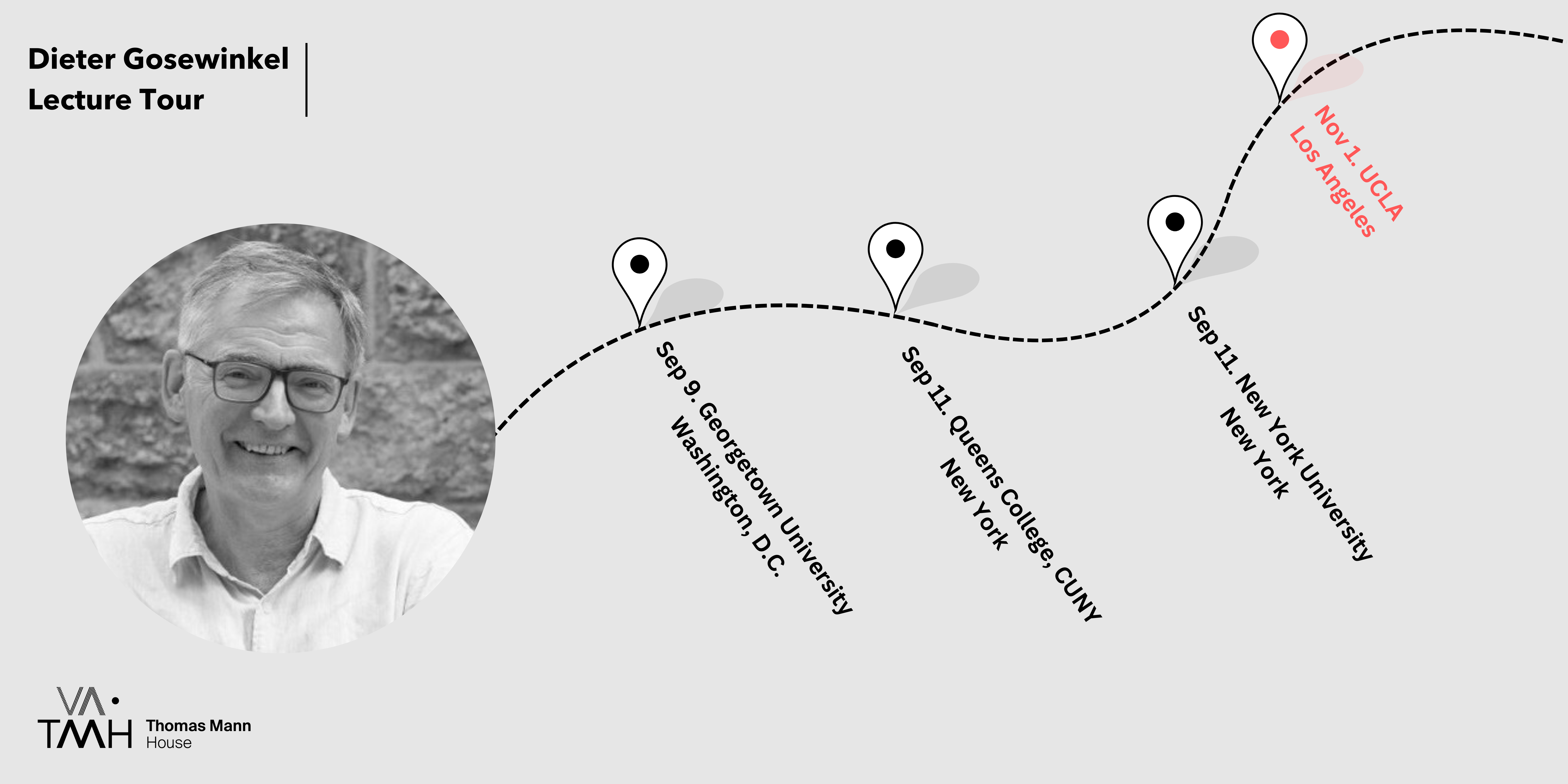
Info
Im Rahmen seines 2024 Thomas Mann Fellowships spricht der Historiker und Jurist Dieter Gosewinkel über die Staatsbürgerschaft im 20. Jahrhundert als wichtigste Form der politischen Zugehörigkeit in Europa und warum sie trotz moderner Entwicklungen wie Globalisierung und Europäisierung weiterhin zentral bleibt. Professor Gosewinkel hat bereits Institutionen wie das Queens College (CUNY), die Georgetown University, die New York University und UCLA besucht.
In diesem Vortrag erörtert Thomas Mann Fellow Dieter Gosewinkel die Bedeutung der Staatsbürgerschaft als Schlüsselform der politischen Zugehörigkeit im Europa des 20. Jahrhunderts und wie sie trotz moderner Trends wie Globalisierung und Europäisierung zentral bleibt. Die Bedeutung, die der Staatsbürgerschaft beigemessen wird, unterscheidet das 20. Jahrhundert von früheren historischen Perioden und anderen Formen der politischen Zugehörigkeit (Religion, Partei, Ethnie, Nationalstaat und soziale Klasse). Mit der Demokratisierung der politischen Systeme, der Ausweitung der Mitwirkungsrechte, der Entwicklung von Sozialrechten und der zunehmenden Abschottung der Staaten voneinander gewann die Staatsbürgerschaft für den*die Einzelne*n immer mehr an Bedeutung. Auch die gegenwärtigen Prozesse der Transnationalisierung, Europäisierung und Globalisierung können die Vorrangstellung der Staatsbürgerschaft nur allmählich und unwesentlich verändern. Die Abgrenzung der politischen Zugehörigkeit und die Unterscheidung von der Nicht-Zugehörigkeit bleiben die primären Funktionen des Staates, auch wenn dieser zunehmend seinen nationalstaatlichen Charakter verliert.
Teilnehmer
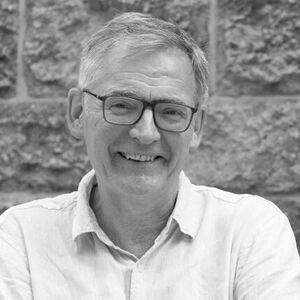
Dieter Gosewinkel ist Historiker und Jurist mit den Forschungsschwerpunkten Moderne Geschichte Europas sowie Geschichte der Staatsbürgerschaft, der Zivilgesellschaft, des Staatsrechts und des Europadenkens. Von 2011 bis 2021 war er Co-Direktor des Forschungsbereichs „Center for Global Constitutionalism” am Wissenschaftszentrum Berlin für Sozialforschung. Er ist aktuell Senior Research Fellow am Hamburger Institut für Sozialforschung. Darüber hinaus war er Fellow u. a. am European University Institute Florence, dem Institut d’Études Avancées de Paris und an der University of Oxford. Er lehrte u. a. an der Freien Universität Berlin und der Sciences Po, Paris.
Partner
Diese Vortragsreise findet in Kooperation mit Queens College (CUNY), Georgetown University, New York University, und UCLA statt.
Media, Artificial Intelligence and the Vulnerabilities of Democracy
Thomas Mann House Los Angeles (1550 N San Remo Drive, Pacific Palisades, CA 90272)

Info
Mit der Einführung von ChatGPT, Midjourney und Dall.E wurde künstliche Intelligenz für den täglichen Gebrauch verfügbar. Heute kann jede und jeder mithilfe generativer KI Texte oder Bilder erstellen – ohne technisches Fachwissen und auf gewöhnlichen Alltagsgeräten. Journalist:innen nutzen schon länger automatisierte Textproduktion und wir sehen zunehmend auch KI-generierte Inhalte in politischen Kampagnen. Wie verändert dies die Art und Weise, wie Bürger Informationen erhalten, den Medien vertrauen und Realität wahrnehmen? Wird KI eine Welle von Desinformation und Deepfakes auslösen oder dazu beitragen, „Fake News“ und Hassreden zu bekämpfen? Kann KI die politische Polarisierung und die Erosion der Autorität demokratischer Institutionen vertiefen? Welche Rolle hat KI im Superwahljahr 2024 mit Wahlen in über 60 Ländern weltweit gespielt?
Die Expert:innen auf dem Podium werden über positive und negative Auswirkungen der künstlichen Intelligenz, die Rolle von Informationen in der Demokratie und die Regulierung von Kommunikationstechnologien in demokratischen Gesellschaften diskutieren. Wer handelt durch KI und wer ist für ihre Auswirkungen auf die Demokratie verantwortlich? Aus transatlantischer Perspektive und auf der Grundlage aktueller akademischer Forschung stellen sie die Frage: Ist die Demokratie bereit für KI?
Teilnehmer:innen
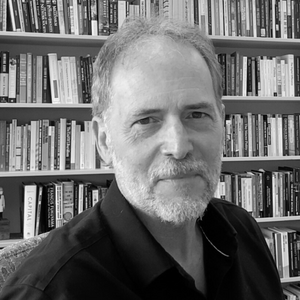
Bruce Bimber is Distinguished Professor of Political Science at UC Santa Barbara, where he studies how democracy is affected by computing and media environments. He has written extensively about how the Internet facilitates the formation of political groups both within the mainstream and at the extremes. In recent years, he has turned to the study of democratic erosion, focusing on the role of social media use in people's belief in conspiracy theories and in the spread of populist and illiberal attitudes. He is a Fellow of the American Association for the Advancement of Science and of the International Communication Association, and a past Fellow of the Center for Advanced Study in the Behavioral Sciences. He is currently working on the use of AI to analyze conspiracy theories and endorsements of political violence in social media.

Claes H. de Vreese is Distinguished University Professor of Artificial Intelligence and Society, with a special focus on media and democracy at the University of Amsterdam. He also holds the Chair in political communication at the Amsterdam School of Communication Research ASCoR. His research interests include the role of automation, algorithms, and artificial intelligence in democratic processes. This includes microtargeting, news recommenders, social media platforms, disinformation, comparative journalism research, the effects of news, and public opinion. He has published a dozen books and more than 250 articles. He is the recipient of the Swanson Career Achievement Award, the NeFCA Career Award, and he is an elected Fellow of the Royal Dutch Academy of Sciences, the International Communication Association, and the Royal Holland Society of Sciences.
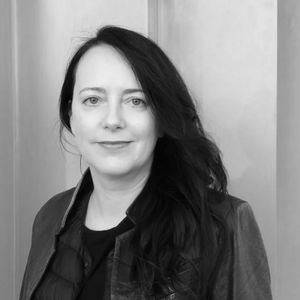
Ulrike Klinger is Professor for Digital Democracy and member of the Board of Directors of the European New School of Digital Studies at the European University Viadrina in Frankfurt/Oder. She is an associate researcher at the Weizenbaum Institute for the Networked Society in Berlin, where she led the research group “News, Campaigns, and the Rationality of Public Discourse” until 2020. She researches digital political communication, technology and power, and the transformation of digital publics.
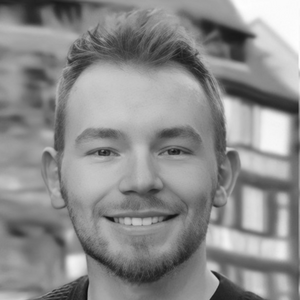
Julien Labarre is an Assistant Professor of Political Science at California State University Dominguez Hills and an affiliate of the International Panel on the Information Environment, a research initiative launched at the 2023 Nobel Prize Summit. He is also the former administrator of the Center for Information Technology & Society. His research focuses on mass media, epistemic problems, extremism, and pathologies of democracy, primarily in the US and France.
Artificial Intelligence, Epistemic Vulnerability, and Democracy
Thomas Mann House Los Angeles (1550 N San Remo Drive, Pacific Palisades, CA 90272)

Info
Nach einer Einführung in das theoretische Konzept der epistemischen Vulnerabilität durch Julien Labarre (2024) werden führende Wissenschaftler:innen aus dem Großraum Los Angeles zusammen mit Thomas Mann Fellows tiefer in die aktuelle Entwicklung der generativen KI und ihre Auswirkungen auf die Demokratie eintauchen. Epistemische Vulnerabilität geht davon aus, dass der fast ausschließliche Fokus auf Täuschung die Rolle anderer epistemischer Probleme herunterspielt, wie z. B. das Misstrauen gegenüber den Medien und die weit verbreitete Orientierungslosigkeit der Bürger:innen als Reaktion auf minderwertige Informationen und Medien, die sie als nicht vertrauenswürdig empfinden. Epistemische Vulnerabilität ist nicht überall und für alle gleich. Studien zeigen, dass nordeuropäische Länder widerstandsfähiger zu sein scheinen als die USA oder osteuropäische Länder. Die Workshop-Teilnehmer:innen analysieren diese Resilienzfaktoren und die Lehren, die wir daraus im transatlantischen Vergleich ziehen können.
In zwei Sessions steht im Fokus, wie KI die Auswirkungen epistemischer Verwundbarkeit mildern und verstärken kann, wie die Idee einer ethischen oder verantwortungsvollen KI damit zusammenhängt und wie Wissenschaftler*innen diese Entwicklungen empirisch untersuchen können – in Texten, Bildern und Videos. Dies steht im Zusammenhang mit Problemen der empirischen Forschung, wie dem Datenzugang und Angriffen auf Wissenschaftler*innen im Bereich der Desinformationsforschung.
Teilnehmer:innen

Bruce Bimber is Distinguished Professor of Political Science at UC Santa Barbara, where he studies how democracy is affected by computing and media environments. He has written extensively about how the Internet facilitates the formation of political groups both within the mainstream and at the extremes. In recent years, he has turned to the study of democratic erosion, focusing on the role of social media use in people's belief in conspiracy theories and in the spread of populist and illiberal attitudes. He is a Fellow of the American Association for the Advancement of Science and of the International Communication Association, and a past Fellow of the Center for Advanced Study in the Behavioral Sciences. He is currently working on the use of AI to analyze conspiracy theories and endorsements of political violence in social media.

Claes H. de Vreese is Distinguished University Professor of Artificial Intelligence and Society, with a special focus on media and democracy at the University of Amsterdam. He also holds the Chair in political communication at the Amsterdam School of Communication Research ASCoR. His research interests include the role of automation, algorithms, and artificial intelligence in democratic processes. This includes microtargeting, news recommenders, social media platforms, disinformation, comparative journalism research, the effects of news, and public opinion. He has published a dozen books and more than 250 articles. He is the recipient of the Swanson Career Achievement Award, the NeFCA Career Award, and he is an elected Fellow of the Royal Dutch Academy of Sciences, the International Communication Association, and the Royal Holland Society of Sciences.

Ulrike Klinger is Professor for Digital Democracy and member of the Board of Directors of the European New School of Digital Studies at the European University Viadrina in Frankfurt/Oder. She is an associate researcher at the Weizenbaum Institute for the Networked Society in Berlin, where she led the research group “News, Campaigns, and the Rationality of Public Discourse” until 2020. She researches digital political communication, technology and power, and the transformation of digital publics.

Julien Labarre is an Assistant Professor of Political Science at California State University Dominguez Hills and an affiliate of the International Panel on the Information Environment, a research initiative launched at the 2023 Nobel Prize Summit. He is also the former administrator of the Center for Information Technology & Society. His research focuses on mass media, epistemic problems, extremism, and pathologies of democracy, primarily in the US and France.
The Virtue and Limits of Political Compromise in Liberal Democracies
Thomas Mann House Los Angeles (1550 N San Remo Drive, Pacific Palisades, CA 90272)

Info
Zusammen mit den Thomas Mann Fellows Pola Lehmann und Johannes Gerschewski veranstaltet das Thomas Mann House einen Workshop über den Wert politischer Kompromisse in der Demokratie aus einer transatlantischen Perspektive mit Expert:innen aus der Politikwissenschaft und dem politischen Aktivismus.
Der Workshop bringt Politikwissenschaftler:innen und politische Aktivist:innen zusammen, um die Ambivalenz politischer Kompromisse in Zeiten zunehmender Polarisierung zu erörtern. Der Fokus liegt auf verschiedenen Aspekten politischer Kompromisse für liberale Demokratien:
(1) Was sind die Voraussetzungen für politische Kompromisse?
(2) Was kann durch Kompromisse gewonnen werden, und was sind auch die Grenzen des Kompromisses?
(3) Und schließlich, wie können Institutionen und Einzelpersonen ein Umfeld schaffen, das förderlich für Kompromisse ist?
Programm
Donnerstag, 21. November
Why and when should we engage in compromise?
The first session clarifies what a political compromise is, what the main features of a compromise look like, and why the ability to compromise might (or might not) lie at the heart of liberal democracies. In heterogeneous and pluralistic societies, compromise is not only a necessary feature of political life, but it can be argued that the acceptance of political rivals as having legitimate interests leads to a self-reinforcing dynamic that underpins democratic processes.
Freitag, 22. November
When should we not engage in compromise?
The second session looks at the limits of compromise, exploring the proverbial “rotten” compromise to ask when we should shy away from forging compromises. This includes reflections on the question of freedom of speech, and to what extent populism impedes our ability to find compromise.
How do the United States and Germany deal with compromise and polarization?
The third session explores the differing way in which political compromise is built into the different political systems of the United States and Germany, comparing two different ways these political systems react and maybe even produce societal polarization.
How to create a conducive environment for political compromise?
The last session discusses what conducive environments could look like that foster political compromise. What makes political compromise more likely? What hinders it?
Teilnehmer:innen
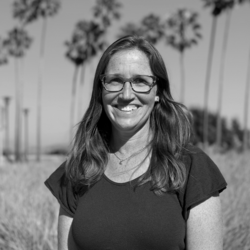
Sarah E. Anderson is a Professor and Acting Dean at the Bren School of Environmental Science & Management at the University of California, Santa Barbara. She studies how the public and politics influences policy. In her 2020 book Rejecting Compromise: Legislators’ Fear of Primary Voters, she focuses on how the public drives inequity and inefficiency in agencies’ wildfire prevention and why legislators reject compromise. In her research, teaching, and service, she works with students, staff, faculty, communities, and leaders to overcome social and political barriers to solving environmental problems and to work toward equity in the environmental field.
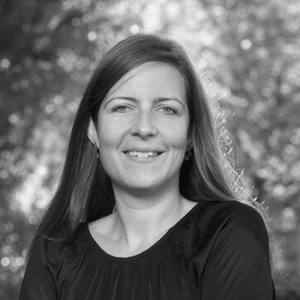
Pola Lehmann is a research fellow at the WZB Berlin Social Science Center and co-director of the Manifesto Project. She studied administrative sciences at the Universities of Potsdam and Copenhagen. Her research focuses on democracy and political representation, political parties and elections, and machine learning. In her dissertation, which won the Leibniz Dissertation Award in 2021, she investigated political representation and compromise in the German Bundestag.
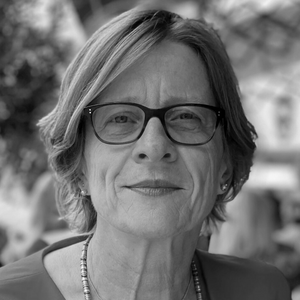
Alexandra Lieben is the Deputy Director of the Ronald W. Burkle Center for International Relations and an affiliated faculty member of the Promise Institute for Human Rights at the UCLA School of Law. A certified mediator, she teaches constructive communication, alternative dispute resolution, public dialogue, cultural competency, international conflict resolution, and community and economic development to undergraduate and graduate students at UCLA.
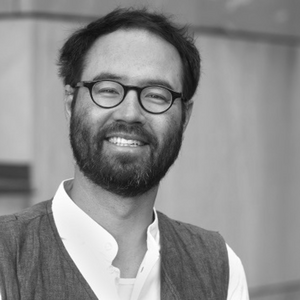
Johannes Gerschewski is a research fellow at the WZB Berlin Social Science Center and coordinates the work of the Theory Network at the Cluster of Excellence “Contestations of the Liberal Script (SCRIPTS).” He has published in academic journals including American Political Science Review, Perspectives on Politics, and Comparative Political Studies. His book on The Two Logics of Autocratic Rule was published in April 2023 by Cambridge University Press.
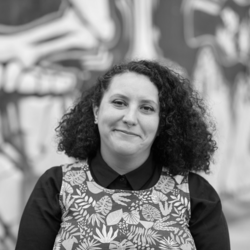
Natalie M. Godinez is an educator and artist raised in Tijuana, México. Godinez has collaborated with AMBOS since 2017, performing artist interventions, leading education projects, and coordinating humanitarian aid efforts. Currently, she is the Community Engagement & Youth Programs Manager at Self Help Graphics and Art, working on advocacy, youth programming, and cultural organizing. In her personal art practice, she explores memories, identity, and relationships to places and language through textiles, printmaking, and collaboration. She holds a Bachelor's degree in Applied Design from San Diego State University.

Allison Lee serves as PEN America’s Los Angeles Director. She was the Chief Development Officer for TIME’S UP, a non-profit organization dedicated to promoting gender equity and ending sexual violence in the workplace. She has previously served as Vice President of External Affairs at Bet Tzedek Legal Services, where she worked, among other things, to launch their Rapid Response Family Immigration Project and Transgender Advocacy Program. Prior to that, Allison served for eight years as the founding Executive Director of American Jewish World Service – Southern California. Allison received her B.A. in Political Science and American Studies from Tufts University.
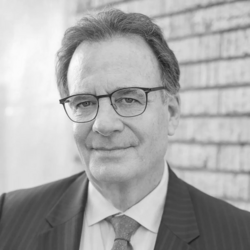
Jonathan Parfrey is the founder and Executive Director of Climate Resolve, and has served as a commissioner at the Los Angeles Department of Water and Power (2008-2013). Parfrey is a member of the LA28 Olympics and Paralympic Games Sustainability Working Group. He is a founder and board member of CicLAvia, the popular street event, as well as a founder of the statewide Alliance of Regional Collaboratives for Climate Adaptation. He served as director of the GREEN LA Coalition (2007-2011). Prior to that, he founded and directed the Orange County Catholic Worker (1987-1993). He was appointed to Governor Schwarzenegger’s Environmental Policy Team in 2003.
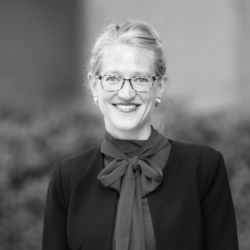
Danielle M. Thomsen is Associate Professor of Political Science at the University of California, Irvine, with a focus on American politics, Congress, elections, campaign finance, and gender and politics. Thomsen’s first book Opting Out of Congress: Partisan Polarization and the Decline of Moderate Candidates was published in 2017, and her second publication The Money Signal: How Fundraising Matters in American Politics is forthcoming with the University of Chicago Press in Spring 2025. Her research has been published in the American Political Science Review, Journal of Politics, Legislative Studies Quarterly, Perspectives on Politics, among others.
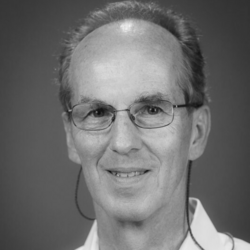
Kurt Weyland is Professor of Government and Mike Hogg Professor in Liberal Arts at the University of Texas at Austin. Based on research conducted in Argentina, Bolivia, Brazil, Chile, Costa Rica, Peru, and Venezuela, he has published many journal articles and book chapters, as well as seven books, most recently Assault on Democracy: Communism, Fascism, and Authoritarianism during the Interwar Years (Cambridge, 2021); and Democracy’s Resilience to Populism’s Threat (Cambridge, 2024).

Thomas Aujero Small is the CEO of Culver City Forward, Chair of LA METRO Sustainability Council and member of the Mobility Committee of the Urban Land Institute Los Angeles. He served as Mayor of Culver City from 2018-2019, during his four-year term as a Culver City Council Member (2016-2020). He is also on the Transportation Policy Committee of the Southern California Association of Governments (SCAG). On the Culver City Council, he served on several Subcommittees, including: the General Plan Update; Economic Development; Mobility, Traffic and Parking; Financial Planning and Budget; and the Ballona Creek Revitalization Task Force.
Populists and the Forgotten Value of Compromise
Thomas Mann House Los Angeles (1550 N San Remo Drive, Pacific Palisades, CA 90272)

Info
Die US-Wahlen haben eine polarisiert Gesellschaft hinterlassen. Unabhängig von persönlichen Meinungen zum Ergebnis haben die Wahlkämpfe die gesellschaftlichen Spaltungen erheblich vertieft. In den letzten Jahren sind öffentliche Debatten über die Covid-19-Pandemie, Einwanderung oder soziale Ungleichheit zunehmend polarisiert geworden. Politische Positionen sind unversöhnlich gegensätzlich und werden immer hitziger und unerbittlicher. Diskussionen werden durch die Darstellung unterschiedlicher Seiten als Vertreter von „richtigen“ oder „falschen“ Antworten angeheizt. Haben wir den Wert des Kompromisses aus den Augen verloren?
Sicherlich ist eine der größten Stärken der Demokratie die Fähigkeit, politische Kompromisse zu erreichen. In heterogenen Gesellschaften ist Kompromiss notwendig. Dennoch hat die Fähigkeit, Vereinbarungen zu treffen und Zugeständnisse bei den drängendsten gesellschaftlichen Fragen zu machen, in den letzten Jahren abgenommen. Jede Seite leugnet der anderen legitime Opposition und unterschiedliche Ansichten zu den strittigen Themen. Populisten spielen mit der Vorstellung, dass es nur einen „Willen des Volkes“ gibt und dass sie die einzigen sind, die diesen Willen vertreten können. Stattdessen werden Kompromisse als Zeichen der Schwäche gesehen. Dies stellt ein großes Achillesferse für heterogene und pluralistische Gesellschaften dar, sowohl in den Vereinigten Staaten als auch in Deutschland.
Natürlich ist der Kompromissfindungsprozess kein Allheilmittel für alle Arten von Problemen. Während er eine Technik zur friedlichen Konfliktlösung darstellt, die pragmatisch den Status quo vorantreibt, gibt es auch Grenzen, die berücksichtigt werden sollten, insbesondere wenn autoritäre Populisten die Demokratie unter Druck setzen. Wann erreichen wir die Grenzen des Kompromisses und wann sollten wir lieber standhaft an liberalen und demokratischen Prinzipien festhalten? Wann schlägt der Kompromiss sogar zurück und legitimiert eine widerlegbare politische Position?
Diese Podiumsdiskussion versammelt Politikwissenschaftler:innen und politische Aktivist:innen, um die Ambivalenz politischer Kompromisse in Zeiten zunehmender Polarisierung zu erörtern. Sie beleuchtet die aktuellen Herausforderungen, die Populisten den Demokratien auferlegen, und diskutiert, wie Populisten Kompromisse verhindern, während sie auch darüber debattiert, wann und wo liberale Demokratien eine Grenze ziehen und Kompromisse einschränken sollten.
Teilnehmer:innen

Pola Lehmann is a research fellow at the WZB Berlin Social Science Center and co-director of the Manifesto Project. She studied administrative sciences at the Universities of Potsdam and Copenhagen. Her research focuses on democracy and political representation, political parties and elections, and machine learning. In her dissertation, which won the Leibniz Dissertation Award in 2021, she investigated political representation and compromise in the German Bundestag.

Johannes Gerschewski is a research fellow at the WZB Berlin Social Science Center and coordinates the work of the Theory Network at the Cluster of Excellence “Contestations of the Liberal Script (SCRIPTS).” He has published in academic journals including American Political Science Review, Perspectives on Politics, and Comparative Political Studies. His book on The Two Logics of Autocratic Rule was published in April 2023 by Cambridge University Press.

Allison Lee serves as PEN America’s Los Angeles Director. She was the Chief Development Officer for TIME’S UP, a non-profit organization dedicated to promoting gender equity and ending sexual violence in the workplace. She has previously served as Vice President of External Affairs at Bet Tzedek Legal Services, where she worked, among other things, to launch their Rapid Response Family Immigration Project and Transgender Advocacy Program. Prior to that, Allison served for eight years as the founding Executive Director of American Jewish World Service – Southern California. Allison received her B.A. in Political Science and American Studies from Tufts University.

Kurt Weyland is Professor of Government and Mike Hogg Professor in Liberal Arts at the University of Texas at Austin. Based on research conducted in Argentina, Bolivia, Brazil, Chile, Costa Rica, Peru, and Venezuela, he has published many journal articles and book chapters, as well as seven books, most recently Assault on Democracy: Communism, Fascism, and Authoritarianism during the Interwar Years (Cambridge, 2021); and Democracy’s Resilience to Populism’s Threat (Cambridge, 2024).

Thomas Aujero Small is the CEO of Culver City Forward, Chair of LA METRO Sustainability Council and member of the Mobility Committee of the Urban Land Institute Los Angeles. He served as Mayor of Culver City from 2018-2019, during his four-year term as a Culver City Council Member (2016-2020). He is also on the Transportation Policy Committee of the Southern California Association of Governments (SCAG). On the Culver City Council, he served on several Subcommittees, including: the General Plan Update; Economic Development; Mobility, Traffic and Parking; Financial Planning and Budget; and the Ballona Creek Revitalization Task Force.




